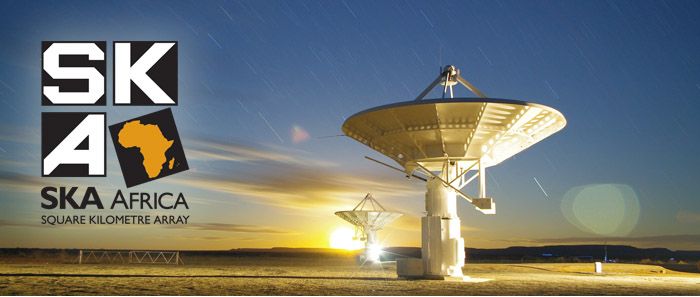SKA News November 2012

The Square Kilometre Array (SKA) will be built at an estimated cost of €1.5 billion, making it the biggest ‘Big Science’ project in the world to be formally launched during this current period of austerity. The agreement to select South Africa/Africa as the main site, with assistance from Australia, was reached by the consortium of countries that have committed to contribute to the cost, including Canada, China, Italy, the Netherlands and the UK. Initial planning for the instrument had been funded by the European Union. The sharing of the project between South Africa and Australia will be around 60 percent SA and 40 percent Australia.
The Office of the SKA Organisation will now lead a detailed definition period to clarify the implementation. This is also referred to as the pre-construction phase. Pre-construction work packages are being designed and industry is being lined up for possible participation in tenders to be launched by the SKA Organisation. The project is expected to be carried out in two phases. The first phase of construction starting in 2013 will allow for limited research by 2020. The second phase beginning in 2018 is due to be ready for complete scientific operations by 2024. Upon completion, the world’s largest radio telescope will comprise 3,000 individual 15-metre wide dishes with a receiver surface of one square kilometre.
There are several benefits for South Africa and Africa in hosting the SKA. The SKA will attract the world’s best scientists and engineers to Africa. To operate, the SKA will require ultra-high speed internet, in excess of 100 Gigabytes per second. Sections of the terrestrial networks in the African partner countries will have to be upgraded by the International SKA Organisation to accommodate the SKA requirements. Direct benefits will accrue in the form of jobs created during the construction and operation of the facility.
Scientific benefits
The SKA will be 50 to 100 times more sensitive than any other radio telescope and this will provide unparalleled dynamical range for studying astronomical objects. The areas of research include:
· Study dark energy and dark matter.
· Measuring gravitational waves using pulsars orbiting black holes.
· Study the formation and evolution of the first stars and galaxies.
· Study the role of cosmic magnetism.
Economic benefits
The SKA represents a net foreign direct investment (FDI) of about €1.5 billion in capital expenditure and €6 billion over a 30-year minimum operations and maintenance period. The creation of thousands of local jobs during the construction phase will provide employment opportunities where every radio telescope station will be built. The project will require highly skilled positions for 500 people in engineering and astronomy. It estimated that 200 of the skilled workers will live in Africa.
The provision of access to broadband connectivity in rural areas of Africa for the SKA will create access to ultra-high performance computing in Africa. The already existing undersea broadband provides new opportunities for business in Africa and also strengthens Africa’s hosting of the SKA.
Socio-economic benefits
To realise the socio-economic benefits of hosting the SKA in Africa, it is important to note that the final design, construction and operation should not be left to the astronomers and engineers only. The planning should include inputs from entrepreneurs, engineers, educators and economists. Engineers and astronomers build good telescopes but require assistance to build good economies, particularly in initiatives of the magnitude of the SKA. In addition to the impact on employment and gross domestic products, the SKA will provide many African countries with access to world class facilities for teaching, training and research. Investment by African countries in astronomy, information technology and engineering skills development, will position African countries to maximise the benefits that can be harnessed from hosting the mega telescope in Africa. The image on the global stage of a favourable destination(Africa) of large research infrastructure creates future opportunities in other unrelated areas of science and engineering.
Read more: Ska News Nov 2012 Newsletter (PDF)


